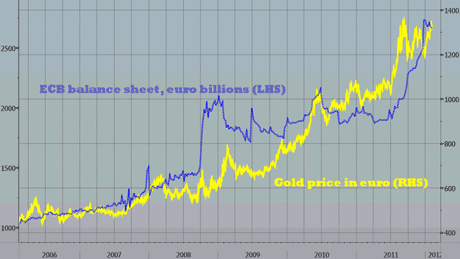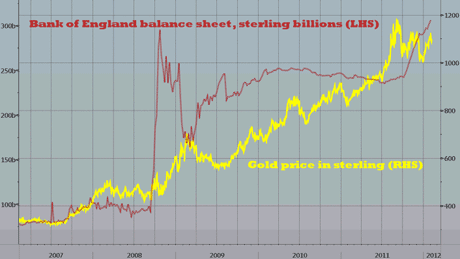Stock markets have enjoyed a cracking start to 2012. The riskier the share, the more likely it’s been to surge. Commodities have joined in the fun too. And the ever-growing band of bulls will tell you there’s plenty more to go for.
But I’m starting to get nervous about this advance in equity prices. Further, I’m not confident the commodity rally can be maintained.
What is making us fret about the rally?
In Europe, shares have risen on hopes that Greek debt woes have now been ‘sorted’. But even a ‘positive’ outcome – another €130bn mega-bail-out – is already factored into the market. This looks like a case of ‘buy on the rumour, sell on the news’.
In addition, for lenders the Greek problem is by no mean resolved. Foreign bondholders will lose around three-quarters of the value of their investment. That’s just one of several ongoing worries for eurozone banks.
At the end of the day, Greece is still bust. And it’s unlikely to become less broke. As Alen Mattich notes in the Wall Street Journal, the country is now “deeply competitive” while the government is “close to dysfunctional, certainly in terms of gathering taxes”.
Meanwhile the whole country is up in arms about austerity measures being imposed by the so-called ‘Troika’ of the IMF, European Commission and ECB.
In other words, regardless of what Greek politicians promise the Troika, the populace may not tolerate more state spending cutbacks. Greece leaving the euro in a ‘disorderly default’ would be the likely end result. And equity markets wouldn’t like that one iota.
Global market upswing
As ever, though, the global market upswing has been powered by Wall Street. But does this make sense? Let’s examine how much more money – or not – US firms are likely to make this year.
The S&P 500 is the world’s most closely-watched stock market barometer. That’s why I keep a close eye on analysts’ quarterly earnings estimates for it.
But most company analysts get too close to the firms they follow. They don’t see earnings downturns until too late. So their ‘bottom-up’ expectations are more of a lagging than a leading indicator.
That’s why I prefer to monitor ‘top-down’ estimates, ie, those compiled by the big picture brigade. And I focus on forecast ‘reported’ earnings. These are the actual hard numbers that companies are expected to produce, rather than ‘operating’ earnings which ignore nasty bits like write-offs, etc.
Again, most strategists tend to be bulls – it’s better for business. Yet the S&P stats are useful for gauging trends in analysts’ thinking.
And an interesting trend is developing. Top-down reported estimates are some way lower than bottom-up. Further, despite the overall US economic picture looking slightly brighter, top-down analysts are now forecasting a 4% dip in American company earnings between April and December 2012.
On those reported estimates, the S&P 500 isn’t particularly cheap on a prospective price/earnings ratio (p/e) of 13.7. And an overall reported profits drop over the rest of 2012 doesn’t sit well with the index climbing higher in the near future. In fact, the potential earnings trend makes a near-term Wall Street pullback more likely.
And when I see headlines appearing on Bloomberg proclaiming “Global Equities set for Bull Market”, and when I see former perma-bears like Professor Nouriel Roubini – the ‘Dr Doom’ who forecast the US subprime mortgage meltdown – turning bullish, I get even more concerned.
Here’s the antidote
There is one investment that every investor needs to own right now. And that’s gold.
This is simply a ‘must have’ holding in your portfolio – despite the recent fall.
The authorities will do everything they can to worm their way out of this crisis. The traditional means of doing this is to print money.
In the Europe, the Long Term Refinancing Operation (LTRO) has handed out cheap cash to eurozone banks to cover their borrowing needs. In turn, a fair chunk of this money has been used to buy sovereign bonds around the single currency region.
The ECB denies it’s descending into quantitative easing (QE). But ten-year sovereign bond yields on the eurozone’s periphery have tumbled since the LTRO kicked in. In effect, the LTRO is the ECB doing QE through the back door.
Why does this matter for gold? When you strip away all the jargon, QE means printing more money by pressing a computer key.
To begin with, that extra cash doesn’t show up in the wider monetary aggregates or the real economy. It sits around in bank vaults. But at some stage in the future, it could leak out and drive up prices – as with commodities in 2009.
Fear of inflation
Fear of inflation is the ultimate driver for gold buyers. They want a currency that will keep its value. That’s why they watch central bank balance sheets. If these starting growing fast, it means QE is underway. And it’s the first sign of potential inflation trouble.
Here’s the growth in the ECB balance sheet since 2006. The blue line show the first major injection of liquidity into the system as the financial crisis hit in 2008. And over the last six months, the ECB’s balance sheet has surged in size again.
No wonder gold priced in euro is on a strong upward march. If the ECB officially sanctions QE – which may well be needed for bailing out the eurozone – gold in euros will climb much higher still.

Source: Bloomberg, FSL
In Britain of course, QE is official Bank of England policy. £275bn has already been created. By the time you read this, at least £50bn more could be joining it. It’s no surprise the UK chart looks similar.

Source: Bloomberg, FSL
Gold had dipped
Gold may have dipped in sterling terms from last year’s peak. And plenty of sceptics will tell you it’ll never get back there.
But the fact is that sentiment is so poor with gold at these levels just indicates that people don’t realise what’s really unfolding.
I think this is going be the finest year we’ve ever had in this bull market. The best up year so far in this gold bull was 36%. I would be surprised if that number were not obliterated this year.
In any case, as I’ve been telling our readers at The Fleet Street Letter, the authorities won’t stop at money printing to save their hides. The reality is that the UK is carrying a massive debt burden. And the government is going to have to do a hell of a lot more to deal with this problem in the coming months.
Basically the bill for the financial crisis is about to come due. And it’ll be the taxpayer paying out.
I think some of the plans that the government is readying to claw back money from taxpayers are absolutely infuriating.
Important information
The Fleet Street Letter is a regulated product issued by Fleet Street Publications Ltd. Your capital is at risk when you invest in shares, never risk more than you can afford to lose. Please seek independent financial advice if necessary. Fleet Street Publications Ltd. 0207 633 3600.
Category: Investing in Gold

